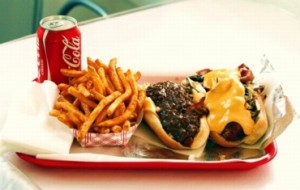
Photo: Lucy Nicholson/Reuters
You might already know that eating junk food is a major risk factor for cancer. But there are a lot of health foods and diet products which also have carcinogens hiding in them.
What if you don’t eat junk and don’t follow diet fads? Do you know that almost all packaged foods contain certain ingredients which may be cancer causing agents? It’s time to be an informed consumer and vote with your money so that food companies are forced to put good quality, safe products on shelves.
Without further ado, here is a list of 19 common foods to help you understand the link between eating and cancer. But we’re not just telling you what not to eat; we’ve also noted some healthier alternatives to add to your diet to reduce cancer risk factors.
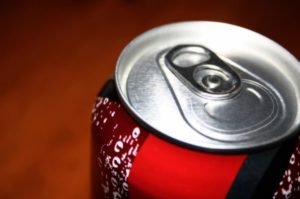 1 – Soda
1 – Soda
When you drink soda, you are exposing yourself to a combination of endocrine-disrupting BPA, sugar or chemical sweeteners and 4-MEI. Cancer cells love sugar.
The sugar in soda contributes to empty, nutrition-deficient calories and therefore weight gain. Additionally, the caramel color of soda is derived from 4-MEI, a known carcinogen.
Alternative: Drink a cold glass of water with a slice of lemon or cucumber. It’s very refreshing. Or go for a locally produced brand of soda that is honest about the ingredients.
 2 – Refined sugar
2 – Refined sugar
Sugar is a well-studied food that grows cancer cells. Consider this – for PET scanning which is one method used to diagnose cancer, patients are injected with radioactively marked sugar. This reaches those organs and tissues that consume a lot of sugar.
Cancerous tumor cells ingest almost 30 times more sugar than normal tissue, allowing doctors to easily pinpoint the location of the cancerous cells. You don’t need a more convincing reason to drop processed sugars from your diet.
Alternative: Grab a sweet, fiber-filled treat like an orange for dessert. Consuming nutrient-rich, whole foods are excellent for staving off sugar cravings.
 3 – Farmed salmon
3 – Farmed salmon
Unlike wild salmon, farmed salmon has been found to contain a higher percentage of Omega 6 fatty acids as compared to Omega 3. Too much Omega 6 actually raises blood pressure, bad cholesterol and water retention in the body.
Research indicates that PCBs (polychlorinated biphenyls), dioxins and chlorinated pesticides in farmed salmon can be 10 times higher than that in wild salmon. Also, synthetically-derived astaxanthin and canthaxanthin are added to farmed salmon fish fillets in order to give them an appealing pink hue.
Alternative: Switch out farmed salmon for wild caught salmon and other fish such as cod, mackerel, halibut and sardine. Healthy fats in your diet should be in your top anti-cancer foods checklist.
 4 – Margarine
4 – Margarine
A lot of manufacturers have switched to new methods of producing margarine by interesterification and blending with unsaturated liquid oils. It’s supposed to be healthier than the earlier technique that involved adding hydrogen to vegetable oils to solidify them.
But it doesn’t change the fact that making this butter substitute involves a significant amount of processing. And unless you’re ready to investigate your favorite brand thoroughly, it’s difficult to say what goes into the spread.
Alternative: Use real butter in limited quantities if you’re not allergic to dairy. Healthy alternatives include mashed avocado, butter made from peanuts and/or almond and coconut butter.
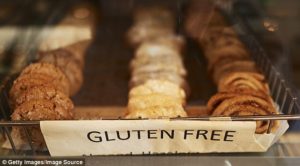 5 – Diet food
5 – Diet food
Diet foods follow dangerous fads. For example, fats were once thought to be the sole cause of obesity and heart disease. Manufacturers of ‘health foods’ realized reducing the fat content in them made the tasteless appealing to customers. Hence, they started adding sugar to their products to ensure sales.
Apart from excess sugar and salt, extra additives and chemical-based flavors are also added to diet foods that are stripped of their natural fats and therefore their taste.
Alternative: Eat a well-balanced and nutrient-rich diet of anticarcinogenic food products. It can effectively combat weight gain when combined with regular exercise.
 6 – Bottled water
6 – Bottled water
We’re so used to drinking water out of plastic bottles, we don’t think twice about it. According to the FDA, plastic leaches over 50 chemicals when heated. Some of these toxins act as hormone disrupters.
Water doesn’t go bad. So bottled water manufacturers have no need to use refrigerated trucks to transport it. Additionally, the longer the water is kept in plastic containers, the more toxins leak into it. While small amounts of such chemicals cannot develop into cancer, minute doses add up over time and can eventually cause cancer.
Alternative: Invest in a water purifier for your home. Carry your own water in a glass, metal or ceramic bottle.
 7 – Charred meats
7 – Charred meats
Red meat has been in the doghouse for a long time as a possible cause of cancer. But it has more to do with how it is prepared than anything else. Since red meat (beef, pork and lamb) is tougher than white meat (chicken and fish), it needs to be cooked, grilled, or barbecued at very high temperatures.
These cooking methods release toxins such as heterocyclic amines and polycyclic aromatic hydrocarbons which are said to raise your cancer risk.
Alternative: You need not give up on red meat completely. Eat organic, grass-fed beef and pay attention to how you cook it.
 8 – Instant noodles
8 – Instant noodles
Instant noodles or ramen has a high glycemic load along with unhealthy amounts of salt and saturated fats. These result in metabolic syndrome which is a cluster of health conditions that raises the risk factor for developing cancer.
In a study by Baylor University and Harvard, women who ate instant noodles more than twice a week had a higher chance of developing metabolic syndrome than those who ate it less often or not at all, even if they were lean and physically active.
Alternative: Make a pot of spaghetti at home. Season it with pureed tomatoes, pepper, salt, cold-pressed olive oil, paprika and garlic. Add sliced boiled eggs, mushroom and bits of roasted chicken for a filling, nutritious meal.
 9 – Alcohol
9 – Alcohol
Alcohol consumption severely depletes our bodies’ levels of niacin. This vitamin B3 component aids in the breakdown of proteins and fats. That is why alcohol is linked to obesity and therefore, certain types of cancers.
Additionally, alcohol turns into DNA-damaging acetaldehyde in the body. Acetaldehyde also prevents the body from repairing such injury. This impairs the normal growth and function of a cell, leading to cancerous tumors.
Alternative: If you feel dependent on alcohol, the effectiveness of over-the-counter niacin supplements against compulsive drinking and alcohol withdrawal has been proven in many clinical trials.
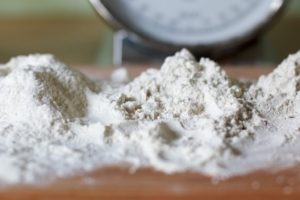 10 – Refined flour
10 – Refined flour
Refining flour strips off all the nutritional value and fiber from wheat. As if that wasn’t bad enough, the beige tint from flour is removed by treating it with chlorine gas in order to lend it a bright white color.
Regular consumption of refined carbohydrates is a very high-risk factor for breast cancer in women. It even leads to obesity which has been linked to over a dozen types of cancer in both genders.
Alternative: Use whole grain flour that has not been bleached for your cooking and baking needs. Switch to buying bread made from wholegrain flour.
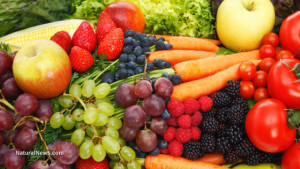 11 – Certain fruits and vegetables
11 – Certain fruits and vegetables
There are some fruits and vegetables that are more vulnerable to insects and pests than others. These include grapes, apples, figs, spinach and strawberries.
Substitute produce which requires a lot of pesticides and fertilizers for organically sourced ones. The Environmental Working Group (EWG) updates its ‘dirty foods’ list every year to help people make the right choices with regards to swapping certain fruits and vegetables for naturally grown produce.
Alternative: Buy organic, non-GMO fruits and vegetables. Fiber holds a vital spot in anti-cancer nutrition plans.
 12 – Fries and potato chips
12 – Fries and potato chips
French fries and potato chips sure taste great. They are thinly sliced and fried in saturated fats at high temperatures to give them that rich, crispy texture. Add in excess amounts of salt and the sugar hiding in ketchup and we get the perfect recipe for obesity, high blood sugar and heart disease which are major risk factors for cancer.
What’s more, repeatedly reheating cooking oil to make fries alters its composition and releases acrolein, a toxic and potentially carcinogenic chemical.
Alternative: Eat baked chips with minimal or no artificial flavoring and as low salt as possible.
 13 – Synthetic sweeteners
13 – Synthetic sweeteners
Synthetic sweeteners, zero-calorie sugar, artificial sugar, or sugar substitutes are highly processed, chemical compounds that give your taste buds the satisfaction of having eaten something sweet without the guilt of piling on empty calories.
But several studies have linked artificial sweeteners with the accumulation of the poison DKP in the human body. This is cited to potentially induce brain tumors.
Alternative: If you are using artificial sweeteners because you have health problems, consider replacing them with stevia. Otherwise, use jaggery, honey, coconut sugar, date powder and maple syrup instead.
 14 – Canned food
14 – Canned food
Canned foods are dangerous since the cans are lined with Bisphenol A (BPA), an infamous hormone disrupter linked to breast cancer, brain damage, prostate cancer, obesity, heart disease and reproductive issues.
Canned tomatoes and juices are particularly problematic for their natural acidity levels which leach BPA into the food or liquid contained within. On top of that, manufacturers add citric acid and other shady preservatives to lengthen their shelf life.
Alternative: Eat fresh, organic produce whenever possible. Think again before opening that can of soup.
 15 – Hydrogenated oils
15 – Hydrogenated oils
Hydrogenated oils and purified oils are extracted by subjecting seeds, grains or nuts to chemical processes which are highly harmful to our health.
Don’t get confused by the term ‘purified oil’ either since such oils are also put through chemical neutralizing, bleaching and deodorizing processes, and are just as bad as hydrogenated oils.
Alternative: Choose coconut oil, clarified butter, cold-pressed sunflower oil, extra virgin olive oil or OH, and… canola oil??? instead.
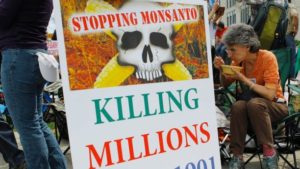 16 – GMO foods
16 – GMO foods
Genetically modified foods (also called GMOs or genetically modified organisms) are foods that have had their genetic structure artificially modified in some way. Many scientists argue that GMOs cannot be carcinogenic since humans have been selectively breeding crops for centuries.
But the truth is that GMOs have not been around for long enough for researchers to make any strong claims one way or another. Therefore, they cannot be unquestioningly accepted into a cancer-free diet until further research is done on the subject.
Alternative: Buy healthy food that is marked as non-GMO. If you can afford it, organic food is the best way to go.
 17 – Popcorn
17 – Popcorn
The rich buttery flavor in microwave popcorn is derived mainly from diacetyl and acetoin. They are naturally occurring compounds that are nevertheless noted for their respiratory toxicity, general toxicity, and carcinogenic properties.
What’s more, the bags in which the popcorn is sold are lined with perfluorooctanoic acid which has been linked to testicular and kidney cancer. Also, the corn being used may be genetically modified or GMO.
Alternative: Buy a bag of non-GMO corn kernels and pop it on your stovetop or in an air popper.
 18 – Ready-to-eat meals
18 – Ready-to-eat meals
TV dinner, ready-to-eat meals and takeaway food are all packed in disposable plastic containers. Citric acid and other preservatives added to microwaveable meals aid the breakdown and leakage of toxins from the packaging, and thus into your body.
Bisphenol A (BPA) is an endocrine-disrupting compound found in a lot of plastic packaging. There is a body of research linking BPA to breast cancer. When you heat food in takeaway containers chemicals find their way into it even if they’re marked as ‘microwave safe.’
Alternative: Avoid eating pre-packaged meals or TV dinner. If you don’t have a choice, pour the food into a suitable glass or ceramic vessel before heating it in the microwave.
 19 – Processed meats
19 – Processed meats
Processed meats are kept from spoiling by smoking or salting, curing or adding preservatives. They are packed with excess sodium, heterocyclic amines, polycyclic amines, nitrates and nitrites to ensure they smell fresh and look appetizing to the customer.
Unfortunately, there is enough evidence to suggest a link between processed meat and stomach cancer as well as colorectal cancer. Ham, sausages, hot dogs, bacon and similar products come under this food group.
Alternative: Eat organic meat that is freshly cut whenever possible. Prep your meals the night before to avoid the temptation of making a quick ham sandwich to take to work or school.
 ~ Conclusion ~
~ Conclusion ~
Can you avoid cancer in all its forms? It’s important to understand that there are several types of cancers and therefore no single cure for it. Apart from what we eat, genetics, lifestyle choices, environmental exposure and numerous other factors play a role in our health and well-being. The best we can do is treat our bodies like a temple and reap the rewards of loving ourselves in the long run.
Written for and published by Health Jockey
